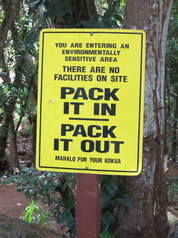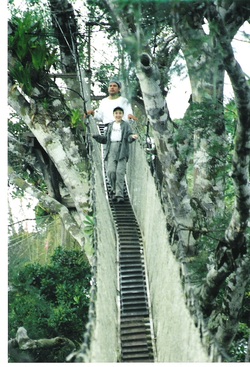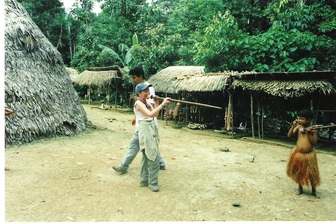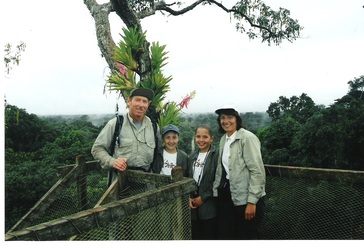Although tourism industries and providers are demonstrating environmental concern and implementing sustainable practices, tourists themselves must be reeducated to make the most meaningful impact. With large numbers of tourists visiting destinations all over the world, the damage to the environment can be tremendous. However, there are steps that all tourists can take to travel more sustainably and responsibly. Tourists have the ability to influence the industry by selecting and supporting sustainable providers and options, which demands the industry to accommodate environmental travelers. Through reeducation, an increasing number of tourists will invest in sustainable tourism providers and practices to protect the environment.

An environmental sign in Hawaii
Reeducating is more than simply posting signs and distributing brochures. This sign (pictured on the left) was posted on a trail along the Hana Highway in Maui, Hawaii. Although this sends a positive environmental message, this is often not enough to influence tourist behavior. Unfortunately, it is a common sight to see garbage littering the trails right next to signs such as this one. Signs (or other written information) can be easily ignored and can only make so much of an impact. Therefore, signs act more as visual reminders for responsible actions, but further action must be taken to truly impact tourist behavior.
Face-to-face and hands-on re-educational experiences are considerably more effective in positively shaping the environmental-conscious behavior of tourists. Resources such as guided tours, interpreters, and visitor centers are invaluable to this effort. When traveling, tourists are typically open-minded to learning and are eager to gain more information regarding the destination they are visiting. This provides the prime opportunity to reeducate tourists not only about the history and attributes of the area, but also how it is being impacted environmentally. The reeducation process also includes explaining the actions that can be taken to best protect the environment, and illustrates why such actions are necessary.
The reeducation process can also further elicit emotions of attachment and may influence a person to travel sustainably. Environmental “educators” (such as guides and interpreters) can further depict the sheer, natural beauty of an area, and describe the devastating effects if environmentally-friendly measures are not taken. Tourists may gain a deeper emotional attachment to a particular area (or the environment as a whole) and obtain a stronger commitment to protect it. These tourists will want to protect the area for personal reasons, and for the enjoyment of future generations. This is quite powerful in altering behavior, and will assist in influencing them to make future sustainable choices and act as advocates for protecting areas from environmental damage. These tourists may even influence others to travel sustainably because of their re-educational experience.

Traci on the Amazon Canopy Walk-way
Personally, I was most impacted by my re-educational experience in the Amazon Jungle in Peru. I visited this destination when I was only twelve years old, yet it was an impressionable experience that opened my eyes to the concept of sustainable tourism. The entire trip was an environmentally educational experience, and impacted my view on the environment and the importance of sustainable tourism.
The exposure to the vast rainforest was an indescribable experience. I was surrounded by massive trees and plants that seemed to continue endlessly in each direction. There was such an incredible range of wildlife, including peaceful and intimidating encounters. During this trip, I had the unique opportunity to walk along the canopy walk-way which provided a breath-taking view of the jungle’s canopy and all of its beauty. These sights and experiences contributed to a personal passion and emotional attachment to this area, but these feelings were further influenced by the reeducation I received.

Traci using a blowgun in a Peruvian village
Our native guide, Raul, provided us with fascinating information that illustrated his knowledge and passion for the natural home where he grew up. The education he provided regarding the jungle has left a lasting impression on the manner in which I view and appreciate the environment. Unfortunately, during this trip, I witnessed the destruction that logging was causing, and Raul explained how much the jungle was being damaged. It was depressing to see, but it strongly influenced me to want to protect the jungle from such destruction. My family and I also had the opportunity to visit Raul’s village, and it was fascinating to see how the native people lived off of the land, without destroying it. Instead of disregarding the environment, they demonstrated how to live in a sustainable manner. I began to realize that if these native people could live sustainably, then as tourists, there is a moral responsibility to travel sustainably.
The travel provider, Amazon Explorama Lodges, also provided as a wonderful example for implementing sustainable tourism practices. Their lodges reflected the native huts of the area, which included minimal modern convinces. This made the experience more authentic, protected the integrity of the area, and reduced the environmental damage that building a resort would have caused. In addition, all of the guides were local natives. This meant that they were experts of the area, and this company was supporting the local economy. In general, this travel provider made every effort to make the minimum environmental impact.
Since taking this trip and receiving this reeducation, I have put more consideration into how I travel. I now seek sustainable travel providers whenever possible and encourage others to do the same. If tourists can all be reeducated when they travel, tourists and the travel industry as a whole, can leave less of a damaging impact on the environment, so that we may all have the opportunity to enjoy it.

Traci and her family in the Amazon Jungle




 RSS Feed
RSS Feed